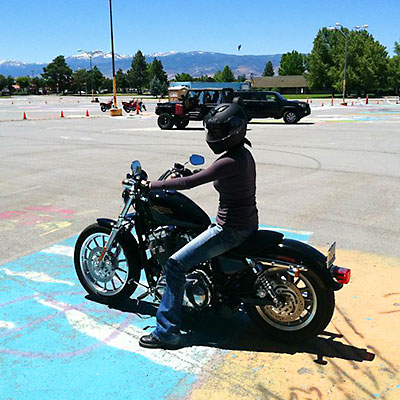
About 650 participants each year take the TMCC Basic Motorcycle RiderCourse, completing a 20-hour program covering safety, maneuvering and evasive riding techniques.
A third motorcycle training range will be ready for classes by the end of August, helping to reduce a waiting list that often reaches 100 hopeful participants by the end of each year.
The range is set at a prime and convenient location for training, on a parking lot that had previously been unused, flooded and covered with dust and debris. As it was being cleared by street sweeping equipment, all you could see was a tall, billowing cloud of thick dust, said Scott Alquist, Program Manager at the Truckee Meadows Community College Safety Center.
For awhile, he thought it might not even be possible to finish building the third training range. The popular Basic Motorcycle RiderCourse at TMCC is typically completed by about 650 a year, and he knew that a third lot would help enable more classes and reduce the long waiting list.
“With Intermountain Slurry Seal, Inc. donating an additional $4,000 in materials and labor to the new range, we can provide additional and safe training for a service that is much needed in the community,” Alquist said. “On an average we can serve between 40 and 64 students a month on a single range, and with the additional location we’ll be able to serve many more students per month.”
He expresses thanks and appreciation for the generous and much-needed donation.
“Wesly Sosa was the representative and facilitator for the donation and Dave Chacon and his crew were the boots on the ground that made it all happen,” he said.
The lot, near the intersection of Mill Street and Edison Way, is now owned by Washoe County. Nevada Rider Motorcycle Safety Program Administrator, Pete Vander Aa visited and inspected the site as part of its approval for use in TMCC’s training program. Washoe County will also allow TMCC to use the lot for the course free of charge for at least the next year.
Each RiderCourse has a capacity of eight students and covers safe and legal operation of a motorcycle. Classes are held through the middle of November, except on holiday weekends.
Training course fulfills DMV requirement
The TMCC motorcycle safety training fulfills the written and skill requirement for a Nevada Department of Vehicles Class M driver’s license.
“Upon successful completion of our course, participants receive a completion card which equals a DMV endorsement for a license and they don’t have to take the written and practical tests at the DMV,” he said. “Most people can also receive a 5-15 percent discount on their insurance after they complete our course.”
He added that other organizations and businesses provide safety training courses, but they typically charge about $275 or more. The TMCC course currently costs $150, he said.
The training consists of classroom and practical instruction. Instructors are called “Rider Coaches” and all teachers have 25 or more years of riding experience and are certified through the state of Nevada. Students follow the Motorcycle Safety Foundation curriculum, an internationally recognized course that is proctored in Nevada by the Nevada Rider Motorcycle Safety Program, a part of the Nevada Department of Public Safety.
The weekend 20-hour courses are typically scheduled on a Friday evening, Saturday and Sunday. Alternatively, the weekday class sections are offered on Tuesdays and Wednesdays from 7 a.m.-6 p.m. on both days. Participants can choose either a weekend or weekday section.
“It’s a great course for both novice and experienced riders for safety, maneuvering, techniques and to break any bad or unsafe habits,” Alquist said. “We go over evasive techniques for obstacle avoidance, avoiding impact with another vehicle or road debris. Instructors cover wearing the proper gear. You ‘dress for the slide, not the ride.’”
What is slurry seal?
Slurry seal coats an existing surface. It's a mixture of emulsified asphalt—to emulsify means to bind two materials together that don’t usually combine, such as oil and vinegar. The slurry seal mixture can consist of fine sand or other aggregate material and oil. Water and additives are sometimes added.
It is typically applied to a street surface about every eight years to extend its life. It's also widely used on parking lots, airfields and some driveways. Slurry seal helps fill small surface cracks and depressions.
“It’s a coating with a little bit of texture for traction and stability, making it safe for students going through the class,” he said. “Intermountain Slurry Seal are supporters of the program and wanted a good safe surface for the student riders.”
The motorcycling community is close-knit
Riders in the community often team up, going on “recon missions” to scope out roads for other motorcyclists.
“In spring, the roads are sometimes still in bad shape from the salt and cinder used during the winter,” Alquist said. “We check out what the roads are like to ride, and then report back to fellow riders. I just got back from scoping out the route to Klamath Falls, Ore.”
Alquist adds that the TMCC-Motorcycle Safety Facebook page has a large following.
“It’s got a lot of good information on the page for our course participants and for anyone in the community,” he added.
For more information about the TMCC Basic Motorcycle RiderCourse, please contact Scott Alquist at 775-857-4958.






